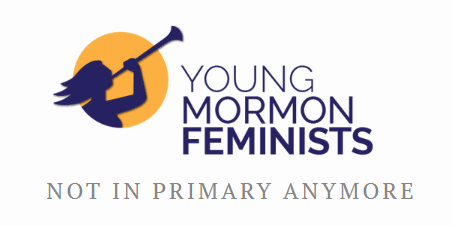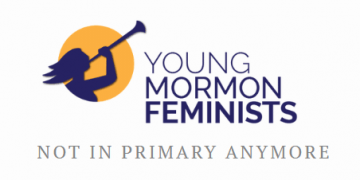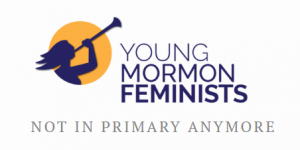Saying Young Mormon Feminists has a bit of a rebellious streak would be putting it mildly. The very foundation for the blog was set back in July 2012 when founder Hannah Wheelwright was still a student at Brigham Young University, and received a particularly memorable visit from her home teachers. They informed her in no uncertain terms that her progressive and feminist ideals could be the perfect storm that would ultimately lead her away from the Church of Jesus Christ of Latter-Day Saints.
Little did they probably suspect their conversation with Hannah would be the catalyst that would help launch a Provo Feminists Facebook page, a place for like-minded women to congregate and share their thoughts and experiences as feminist women of faith. As it turned out, Mormon women liked feeling both seen AND heard, and hundreds of them flocked to the Facebook page. It became so popular, in fact, that it was eventually turned into its own blog website, today known as youngmormonfeminists.org.
The blogosphere in the early 2010’s was not short on worthy Mormon feminist blogs, but what would set Young Mormon Feminists apart was a specific space designed for a younger generation of feminists who were part of a different wave than that of their predecessors— unapologetic, edgy, and focused on intersectionality. Since its inception, Young Mormon Feminists has been visited by hundreds of thousands of people and accumulated hundreds of posts from bloggers on topics ranging from reviews of LDS literature, to postulating about the gay law of chastity, and everything in between.
After several years at the helm of YMF, Hannah Wheelwright decided to pass on the administrative torch in 2017 in order to pursue other passions and interests. Fortunately, from time to time, several talented bloggers continued to produce content that challenged readers to think critically about their beliefs and examine their biases. And so, the blog has lived on, but at present, it is in need of new blood. Currently, the torch is being carried by me, Brittany Sweeney-Lawson, and my goal is to not do so alone.
So if you, yes YOU reading this right now feel fired up about feminism, I invite you to join YMF as a contributing writer and help spread the gospel of intersectionality and inclusivity. It takes a beehive to make a Deseret, ergo, we need voices from all genders, races, and walks of life represented on the blog. If you’d like to learn more or already have ideas for posts percolating in your head, reach out to me at [email protected]. To see some of the posts that have made the blog so impactful in the past, visit the website at youngmormonfeminists.org, and/or join the Facebook group and page.
Below is some additional information taken directly from YMF’s “About” website page that will help elucidate the blog’s purpose, who its audience is, and also answer some frequently asked questions.
We are young Mormon feminists advocating for change.
We are young:
We respect the sacrifices and efforts of people in the feminist movement throughout history. Their tenacity and unwillingness to compromise on the values they held dear resonate with us as stalwart examples of commitment to progress. We embrace this heritage and are dedicated to carrying it on as the next generation of young feminists. We are not naive; we may not remember or have even been alive at the time of many important feminist events, but we are actively seeking to learn and understand our heritage as we continue to fight for women’s rights today.
We are Mormon:
We are current members, past members, questioning members, and people who culturally identify as Mormons. We decry attempts to demean our faith based on our quest for greater understanding and equality. We value the efforts of Mormons who have battled both publicly and privately, loudly and silently, for change. As we navigate the paths of our own coming-of-age eras, we appreciate the ability to learn, grow, and take action for what we believe is right. We plead for a common understanding that each individual’s understanding of and relationship with deity is personal, private, and not to be coarsely judged by others.
We are feminists:
We define feminism as the advocacy for women’s rights on the grounds of political, social, and economic equality. Furthermore, we acknowledge that there are a myriad of different oppressions and dedicate ourselves to the dismantling of kyriarchy. We reject the acceptance of extreme connotations as the definition for feminism and urge all people to do the same. We are not ashamed to call ourselves feminists. We are people actively seeking to eradicate vestiges of injustice in our societies in small and simple ways.
Frequently Asked Questions:
Q. Exactly how young is “young”?
A. Although all are welcome on this blog, the average visitor is between 15-30 years of age.
Q. I see that some of your articles are not strictly about Mormons and feminism. What’s up with that?
A. Not everything is strictly related to the LDS Church, but we all write from the perspective of being young Mormon feminists.
Q. Why are there so many men contributing? This is supposed to be a feminist blog!
A. Our vision for the future of the feminist movement is that it will be made up of people of all sexes and genders. Everyone is affected by patriarchy and kyriarchy, and we welcome all people to educate themselves and eliminate oppression however they can.
Q. Do you have a current temple recommend? Does your bishop know about this? How can you be faithful members?!
A. As stated above, every contributor’s standing before God is their own business. We appreciate you not judging us for our heartfelt searchings for understanding. Also, not all of the contributors are currently active members.
Q. I think you just need to have a little more faith.
A. Thank you for your opinion.
Q. I have a question but it’s kind of personal. How can I contact you?
A. You can always email us at [email protected]. We welcome your questions!







8 Responses
Trying to be positive here but the “young” thing is a little (lot) annoying if I’m being honest. As if women over thirty are incapable of being woke to intersectionality, etc. Sister, we’ve been talking about that for a long time. If that’s what you want your audience to be limited to that’s great but it’s a huge turn off for me personally. Might be good to read up on the very real feminist problem of the invisibility of older women.
This seems like the perfect place to say: OK, Boomer.
Super funny. I’m mid-thirties but thanks.
Or you could make older participants welcome without making us feel like obsolete Boomer geezers. Where’s intersectionality in this?
I’ve read YMF in the past and it makes me happy to see it evolve and revived. We all have to fight entropy, yanno.
I’m 52 and I am actually too young to be a Boomer.
That’s exactly my point. I’m sorry if I came across as whiney or defensive – that wasn’t my intent. My point is that if you are going to post this to an audience with a wide age-range and truly are interested in their participation/support, you may want to consider how off-putting your branding/messaging around age is particularly where, as I mentioned, discrimination against older women is a very real thing and ought to be part of the intersectionality you claim to value. In fact, I remember back when the group started (and when I was in the target age range) cringing at the name and rhetoric around age. If you don’t care about that or disagree it’s a real problem, cool, agree to disagree and obviously you’re entitled to focus on what you choose to since it’s your group.
I’m really glad to see this blog get reinvigorated! I definitely see space in the larger Intersectional Mormon Feminist movement for your unique perspectives, and I’m really interested to hear how you’re navigating your specific junctions of the intersectionality web. I imagine that intersectional feminism looks a bit different in YSA wards, as young single adults who are working or in school, young married folk just starting out with new careers, plus more. I imagine that the process of self-differentiation from parents and their belief systems would look and feel different in this age bracket versus middle age or beyond. And i think the things that unite the MoFem platforms (shared desires to root out oppression in systems and in individuals) can be approached in just about every direction (including yours.) I’m glad for more people to be involved in this work! I’m glad to see leadership and writing skills develop in younger MoFems, and your platform will definitely give opportunity to many in that regard. You’ve got collaborators and friends here at Exponent II, cheering you on.
Hi everyone. Thanks for your comments regarding this post; I appreciate the various viewpoints presented. It’s definitely a noteworthy concern that women of a certain age in the church may be prone to having their voices censured. We’re certainly not trying to do that over at Young Mormon Feminists. In the FAQ section, it states that, “all are welcome on this blog,” though the average visitor is between 15-30 years of age. As this post details a bit, the reason Young Mormon Feminists was started (and so named) was because though there were a lot of great Mormon Feminist spaces and blogs cropping up in the early aughts, not many directly spoke to the experience of women in that often-times challenging transitory period between Young Women’s and Relief Society. There is, for example, that ever-present pressure from the church to marry early and start a family. Feminists of up- and-coming generations often times deal with different challenges than their fore-mothers and grandmothers.
Other sites like Feminist Mormon Housewives also lend themselves name-wise to a niche category of Feminism, a particular life stage, although a great deal of their content is accessible to women across the spectrum of Mormonism and Feminism, whether they’re housewives or not. We’re striving for a similar vibe with YMF as well. At the end of the day, whether young of body, mind, or heart, everyone is invited to interact with and enjoy the blog, and I hope many of you will. Also, thank you to those of you who expressed excitement and encouragement for YMF’s revival. I hope you all enjoy the content to come in the near future! 🙂